*CSIR- Central Road Research Institute (CRRI), New Delhi, which was founded in 1952, has pioneered the development of a revolutionary Steel slag road technology which facilitates the large-scale utilization of waste steel slag of steel plants in road construction
*Minister says, Steel slag technology in paving the roads is in tune with PM’s “Waste to Wealth” Mantra. This innovative technological initiative also addresses the problem of environmental degradation caused by waste steel slag and unsustainable mining and quarrying of natural aggregates
*India’s network of National Highways, at 1.45 lakh km, is now the second largest in the world after the United States
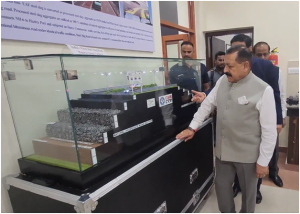
TTT NEWS NETWORK
NEW DELHI, 17 JULY 2023:
Union Minister of State (Independent Charge) Science & Technology; MoS PMO, Personnel, Public Grievances, Pensions, Atomic Energy and Space Dr Jitendra Singh today announced that India has developed the world’s latest Steel Road technology. He informed that CSIR- Central Road Research Institute (CRRI), New Delhi, which was founded in 1952, has pioneered the development of a revolutionary Steel slag road technology which facilitates the large-scale utilization of waste steel slag of steel plants in road construction.
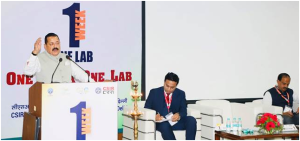
The Minister further disclosed that in June 2022, Surat in Gujarat became the first city in the country to get a processed steel slag (industrial waste) road built as part of a joint-venture project by the Council of Scientific and Industrial Research (CSIR), Central Road Research Institute (CRRI), Union Ministry of Steel, government think-tank NITI Ayog, and Arcelor Mitttal Nippon Steel (AM/NS), at Hazira.
Slag is made up of impurities melted out of the ore during the steel-making process in most of the Steel Plants.
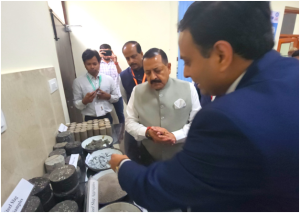
Dr Jitendra Singh said steel slag technology in paving the roads is in tune with Prime Minister Narendra Modi’s “Waste to Wealth” Mantra. “This innovative technological initiative also addresses the problem of environmental degradation caused by waste steel slag and unsustainable mining and quarrying of natural aggregates. CRRI has developed several key technologies for sustainable utilization of waste materials in road construction”, he said.
The stretch of six-lane road experimentally paved with slag from AM/NS plant has been shown to resist beating from weather as well as from thousands of heavy trucks, even though the surface is 30% shallower than that of roads paved with natural aggregates.
The Border Roads Organisation (BRO) also used steel slag to construct a long-lasting heavy-duty road at Arunachal Pradesh along the India-China border area. The steel slag material was given by Tata Steel Ltd free of cost and transported from Jamshedpur to Arunachal Pradesh by Indian Railways free of cost. Besides, India’s largest road building agency, National Highway Authority of India successfully tested the Steel Slag Road technology on NH-66 (Mumbai- Goa).
Dr Jitendra Singh, who visited the Central Road Research Institute here today, said that the steel slag road not only cost about 30% cheaper than conventional paving but they are also more durable and resistant to weather vagaries.
“Steel slag roads have been found to last ten years as compared to three to four years for bitumen roads, thus bringing down sharply the maintenance costs. In Surat, the steel slag road top has been found to weather the erosive saline marine environment while in the cold, snowy and torrential rain prone toughest Himalayan terrain, the steel slag roads have been found to last longer” he said.

India is the world’s second largest steel producer. For per ton of steel production around 200 kg Steel slag is generated as solid waste. Steel slag generation in the country is about 19 Million tons per annum and expected to reach 60 million tons by 2030. This huge quantity of steel slag is piled up in and around the steel plants as big mounds and becoming the source of air, water, and land pollution. The potential valorisation of steel slag as processed steel slag aggregates provides an environment friendly cost-effective alternative of natural aggregates for road construction in the form of steel slag road.
The Science & Technology Minister called for more engagement, synergy and pooling of resources between the CRRI, government think-tank NITI Aayog, various Central Ministries including Steel, Road Transport and Highways, Urban Development and Rural Development, NHAI, engineering institutes such as the IITs, NITs & IIITs besides the private sector steel majors such as TATA STEEL, ARCELOR MITTAL NIPPON STEEL INDIA, JSW STEEL and Rashtriya Ispat Nigam Limited.
“The idea is to increase the scale of road construction. Once you reach out to the market, you have a linkage with the industry, the industry is expected to sell it across, and to do so, they have to propagate themselves,” he said.
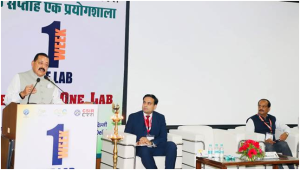
Nearly 50,000 kms of National Highways have been added in the last nine years, while the pace of construction more than doubled from 12 to 29 km/day since 2014. In May this year, India achieved a milestone by laying 112.5 lane kilometres of bituminous concrete road within a timeframe of 100 hours.
“India’s network of National Highways, at 1.45 lakh km, is now the second largest in the world after the United States, and it has increased by 59 per cent in the past nine years of the government led by PM Modi. Construction of National Highway in the country grew to 1,029 kms in January 2023 from 419 kms in August 2022 to achieve this feat,” he said.
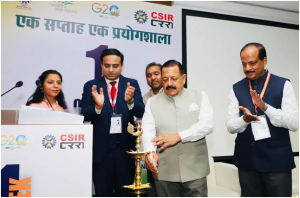
During the visit, Dr Jitendra Singh also launched the CSIR ‘One Week One Lab’ programme. He also interacted with students being conducted on a guided tour of CRRI as part of the ‘One Week One Lab’ campaign.
Dr Jitendra Singh lauded the CRRI for partnering with the Central Electronics Engineering Research Institute (CEERI) in Pilani for an AI mission project, which seeks to harness the power of Artificial Intelligence in transportation systems. During the visit, the Minister inspected the Mobile Cold Mixer-cum-Paver, specifically designed for constructing roads in high-altitude regions, and the Patch Fill-Pothole Repair Machine, which enables quick and economical repairs of roads in both urban and rural areas.

Advertisement:











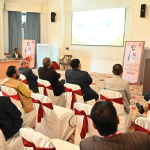
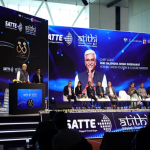
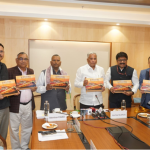






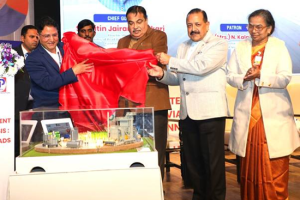
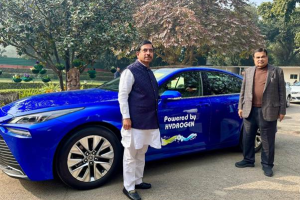
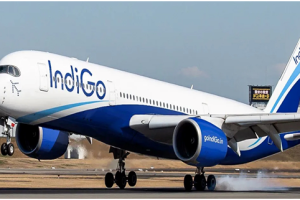







Add Comment